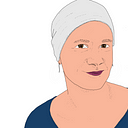Walking on eggshells — surviving social capital
I’ve never done well with groups. Some of my earliest social memories were feeling like everyone around me was under a spell that left me confused and outside. In retrospect, there were lots of reasons for me to feel excluded; my transness, femininity and sensitivity were a lethal combination. My class was also a factor during the times I went to mixed-class schools. But there was more to it than that. No matter how much I tried, I couldn’t get my head around this mysterious state of how to be cool.
In the militarised, working class environment I grew up in, hard work was something desirable and encouraged. Could this be a source of coolness? I worked twelve hour days throughout high school supporting my family and I can confirm that it didn’t earn me a single iota of coolness. Another decade of invisible labour in the radical left didn’t either. It also didn’t seem that the cool people were doing anything I found particularly interesting. By fourteen I was deep in environmental activism and as committed as I’ve ever been. The cool kids had no such passion and yet, even in this pre-internet era, people were being granted all kinds of social capital just for already being cool. And by bullying kids like me, they earned themselves lots more of it.
Fast-forward twenty years, I’m lost in the radical left and nothing at all has changed. Prettiness and money and degrees and class and the right vocabulary and haircut still count more than dedication or authenticity. Capital is still reinvested to make more capital while the rest of us barely get by.
Social capital is power. People in our scenes seem willing to eat each other if it means a few more followers or a little bit more power. And as these scenes (let’s please never call them communities) are built on double standards, I’ve discovered that privilege begets privilege and cool people gatekeep coolness. In our little world, that also means that they gatekeep affordable housing and access to social spaces, desirability, financial resources and the menus of collective food. In other words, they gatekeep survival.
Those who have more, get more, and those of us most in need of community support (we who have no family support, trust funds, employment or inherited property) are the first against the wall. People like me and some of my friends, need to be extremely careful — one wrong word and we’re out. And I speak from decades of experience on several continents.
I’ve been told that everyone experiences this, that we’re all walking on eggshells and being vigilant not to say the wrong thing. It’s the toxicity of call-out culture, I’m told. We’re all affected, I’m told. I don’t agree. I see people with more social capital in our circles saying and doing anything they like, with apparent impunity. I’ve experienced classism, ableism, transmisogyny and sexual assaults within the scene that would put the mainstream to shame. And accountability doesn’t serve people like me.
To add to my confusion, we also live in times of virtue signalling and ally theatre, so when people make public declarations on social media about their solidarity with trans women — and then never follow through — I’ve learned that it has a consistent logic. They earned social capital and didn’t have to do anything uncomfortable.
What I need to remember is that the rules of this social capital game — a game with the highest of stakes — will always be stacked. The tides of fashion are capricious in the radical left and I would never again want to rely on them for my survival. I learned that lesson the hard way.
I hate the social capital game, it makes me deeply uncomfortable. But I think I’m also jealous because I’m losing it so badly. A friend recently told me: ‘Otter, you’re smart. You could have a much bigger following and a lot more success by now. You just need to be less inclusive in your writing, more performative in your organising. Just more selfish in general.’
While I think there are some of my intersections that smart just won’t fix, she had a good point. All I would need to do is sell out my politics, stop giving a fuck about anyone else and I could be rich! I could be yet another queer celebrity!
But we know that isn’t going to happen. This spring, embarking on a book tour slog across eight countries, I suddenly had a crisis that I might be selling out. That I had become a part of celebrity culture. That I was using my privilege to take space away from everyone else and I should be deeply ashamed of myself. It took another friend to remind me that I’ve been earning 2€ an hour for the last three years with no days off and no access to medical care, and that I’m still barely getting by.
What’s sad is that I honestly was worried that I might have sold out just because for the first time in my life, I wasn’t entirely being ignored.
I’m still mystified by coolness and social capital, but I increasingly understand the logic behind it. Sometimes ‘activism and solidarity’ were never really about showing up for others or fighting for justice. Sometimes gatekeeping community resources was about maintaining comfort and not safety at all. Sometimes it was all middle-class playtime leading to a mid-twenties sell-out and honestly, I’m beginning to see through it. One day I might even come close to understanding. But those people have nothing I need. And they sure as hell better stay out of my way.
